|
|
 Stephen Vincent
flickr
Yucatan - A Visit, An Exploration
Stephen Vincent
Imagine Charles Olson - 6 feet 9 inches tall - in ascension here(Uxmal, Yucatan, 1953)! Topmast, indeed. So much more close to the stars. Conch to the ear. Listening.
I have been reading, and re-reading the Mayan Letters, his correspondence with Robert Creeley. It might be instructive to imagine Olson - not that many years away from the publication of Call Me Ishmael (1949), his exploration of Moby Dick & Herman Melville (which I have not read in a long time.) Instead of a whale ship, to see Olson rising up a Pyramid at night - as if a ship’s mast - to read the stars, as certainly a Captain must do. To pretend himself a Mayan looking at the stars - who mistook Venus for one - and the passage of the moon as a way to determine Knowledge - to calculate Time in the largest possible sense, then to take that knowledge and convert it into an architecture as in these various pyramids including the number of risers to the steps in each quadrant , the coordinates of north, south, east and west, etc. Then to make the pyramids be composed of temples to service both messages from the gods, and to determine the lay of relationships within the community, the harvest from land and sea, etc. The pyramid as a knowledge factory. Then, for Olson, to honor the language of glyphs, to try to decipher the location, vitality and power of words within the mythos and regualtion of this community. ...(more)
_______________________
Burn the Panopticon: Irigaray's Ethics, Difference, Poetics
Simone Roberts
Reconstruction 5.1 (Winter 2005)
At last, we arrive at a "conclusion," one that opens on a future instead of closing on the past. Wonder is a faculty of the mind, lust one of the body. In an ethics and poetics of difference honors, promotes, embraces and is curious about the differences between wonder and lust, the mind and the body, thought and pleasure. These "opposites" must be made to harmonize, to resonate with each other. The subject-self represented by the ideal subjectivity of the poet has burned the Panopticon within. She or he works to eliminate the paranoid watcher, the jailer, who sees the other as only a "hostile freedom" or as only an object of use. This section of the essay describes that subjectivity, its Diotiman relation with itself and the other-subject. At last, here the argument is completed that this mode of subjectivity and selfhood is the key to a future of mutual fecundity, of mutual and healthy expansion of self and spirit in a future history other than the bloody and bilious past.
What these ventured subject-selves need in themselves is a rebirth of wonder, self-reliance, and courtesy. People seem, these days, a little sick from experience, callused. Not that this condition is really our fault. Very few people are trained to remain open to possibility, to seek action, to remain compassionate while protecting themselves from scarring in the face of one global, national, local or private atrocity after another. It is a very difficult balance, and a disaffected kind of withdrawal seems the most common response to it all. But that ironic apathy will not do. Wonder may be the way out....(more)
reconstructionstudies in contemporary culture
_______________________

Intervision
Victor Brauner and Roberto Matta
1955
_______________________
A Setback for the State of Exception
Scott Horton
For the past seven years, Americans have witnessed an effort to engineer a “state of exception” to the American constitution. Its key element has been a new definition of war—the “war on terror”–which has neither territorial nor temporal boundaries. This war, as the Bush Administration crafted and advanced it, never served the security interests of the United States.(....)
the Bush Administration’s conceptualization served a different agenda. It was designed to bolster an assertion of unprecedented executive power, a reshuffling of the political cards at home. The executive was to emerge as the paramount power in the nation’s government, relegating the other branches to the status of constitutional hood ornaments. The Republican Party was to be anchored in to a generation of rule.
This dark calculus drove a reckless decision to breach centuries-old traditions concerning the humane treatment of prisoners and to craft the concentration camps at Guantánamo. Now the Supreme Court has condemned its lawlessness for the third time. Unlike the prior two efforts, however, this time the Court strikes at the dark Schmittian heart of the Executive’s claims to unconstitutional power. The ruling therefore has broad ramifications for future issues arising out of the war on terror, including many aspects of the Administration’s program for dealing with detainees....(more)
_______________________
The 'F' Word
Adapted fromThe Family, by Jeff Sharlet
Moral Re-Armament’s aims were so broadly utopian as to be meaningless, but in practice it served distinctly conservative purposes: the preservation of caste. “There is tremendous power,” preached Buchman, “in a minority guided by God.” In a sympathetic portrait published by The New York World-Telegram, Buchman named names. “But think what it would mean to the world if Hitler surrendered to the control of God. Or Mussolini. Or any dictator. Through such a man, God could control a nation overnight and solve every last, bewildering problem.” He thought the process had already started: “I thank heaven for a man like Adolf Hitler, who built a front line of defense against the anti-Christ of Communism,” he told the reporter.(....)
That dream survives today. Not just in the political ambitions of Christian Right politicians, currently an embattled species, but even more so in the seemingly sanguine lifestyle fundamentalism preached by mega-pastors such as Joel Osteen (author of Become a Better You), whose very name is trademarked, and Rick Warren, author of the mammoth-selling Purpose-Driven Life -- and, as of April 2008, the official sponsor of Rwanda, which under his guidance has submitted to soul surgery on a national scale to become the world’s first “Purpose Driven Nation,” embracing Warren’s amiably-phrased mixture of obedience theology and Bible-based capitalism as an antidote to godlessness, whether that comes in form of genocide or socialism. Warren, despite his mild-mannered demeanor – or maybe because of it – doesn’t make distinctions. Either you’re with God, or you’re against Him.
And yet, Rick Warren, Joel Osteen, and the business-friendly fundamentalism of the post-Christian Right era don’t set off liberal alarms the way the pulpit pounders such as John Hagee, Pat Robertson, and James Dobson do. The irony is that the agenda of this new lifestyle evangelicalism is more far-reaching than that of the traditional Christian Right: the Christian Right wanted a seat at the table; lifestyle evangelicalism wants to build the table. It wants to set the very terms in which we imagine what’s possible, and to that end it dispenses with terms that might scare off liberals. It’s big tent fundamentalism – everybody in....(more)
_______________________

"A Thousand Centuries"
Center view
Esther Parada
Montage/Critique: Another Way of Writing Social History
George L. Dillon
pmc
Understanding dialectical images is crucial to understanding how Benjamin wanted "montage" to work in his reading of the book of the nineteenth century. Understanding it is not crucial, however, for tracing references to Benjamin's method by subsequent writers, who do not choose to pursue dialectical images in greater depth. One thing that they do extract from Benjamin, however, is a method of juxtaposing multiple and incompatible accounts of particular phenomena drawn from diverse sources, forcing readers who want to make a coherent account to do some work with the fragments.
As everyone who has worked with montage in the last 50 years eventually realizes, the power of juxtaposition to shock people into novel and more reflective awareness has long ago faded into the daylight of television and advertising uses. Shock in any case is a very one-sided way to describe the effect of montage, since it says nothing about the work the reader/viewer must do to connect the juxtaposed parts and to order them into larger wholes. Theories of tearing from context (or quoting--all quotes, someone said, are out of context) and recombining into revealing configurations more directly acknowledge the synthesizing acts of reader/viewers, but leave the door open to the kind of surrealism that worried Adorno: things are recombined according to a logic of dream or personal association to constitute a surreal, fantasy world. The advent of digital collage and montage (or simply "digital compositing"), with its capacity for nearly seamless and effortless combination of images, has indeed stimulated a new rush of surrealist images. ... Such images do not attract dialectical readings.
So how is critical digital montage possible?...(more)
Esther Parada: 1938-2005
James Rajotte Afterimage, Nov-Dec, 2005
Esther Parada
To Make All Mankind Acquaintainces
_______________________
 Atlantic Wall Atlantic Wall
Christophe Abrassart
polar inertia
via Bryan Finoki (Subtopia)
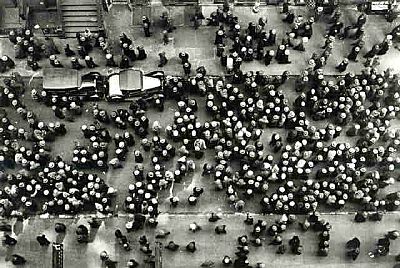
Hats in the Garment District
New York, 1930
Margaret Bourke-White
_______________________
Even if you can't shape your life the way you want,
at least you can try as much as you can
not to degrade it
by too much contact with the world,
by too much activity and talk
Do not degrade it by dragging it along
taking it around and exposing it so often
to the daily silliness
of social relations and parties,
until it comes to seem a boring hanger-on
--
C.P. Cavafy
courtesy of Caterina
_______________________
Audio Stevens
Al Filreis
_______________________
Jerome Rothenberg has a new blog,
Poems and Poetics
On Jackson Mac Low
My first response to Jackson’s aleatory/chance experiments was a degree of puzzlement but a sense beneath that that something real & important was taking place. I fell for him first at a reading in which he introduced the first several of his Light Poems, impressed enough by those so that whatever else he did entered at once into the realm of my possibilities....(more)
_______________________

Bread line
Kentucky, 1937
Margaret Bourke-White
June 14, 1904 – August 27, 1971 1 2 3 4
Margaret Bourke-White History Making Photojournalist and Social Activist
Patrick Cox
Photographing the Representative American:
Margaret Bourke-White in the Depression
_______________________

Domestic Workers Waiting for the Bus
Atlanta, GA
Joel Sternfeld
1 2 3 4 5
6 7 8
_______________________
Tightening a Belt with No Notches Left
Nicole Colson
_______________________

bank vault
October 29
Margaret Bourke-White
_______________________
Bangor Public Library
After previously only be available to library card holders from within the Bangor Public Library, access to JSTOR is now available to card holders off-site.
Library Card Application - free to full-time residents of Maine.
.....................................................
Bravo Bangor! If JSTOR won't see reason, free the public, one hamlet at a time.
- Tom Matrullo
_______________________
Stationary fetishism and gadget love meet in perfect union.
- Chris Meade

How To Turn an iPhone into a Moleskine Book
Charlie Sorrel
The iPod Touch makes a great e-book reader, with a large, high-resolution screen and touch navigation. (....)
the little iPod gets uncomfortable to hold after a while, and it lacks the presence of a real book. Imagine seeing an attractive girl (or boy) sitting outside a pavement café, drinking an espresso, smoking a Gauloise and reading a tatty paperback. It's a romantic image which is shattered when you swap the book for a PDA. I decided to disguise my iPod as a book, and if that wasn't pretentious enough, I put it in a modded Moleskine, the notebook of choice for fops and dandies the world over. Follow along to see how it turned out....(more)
_______________________
Beckett, Bourdieu and the Resistance to Consumption [PDF]
Liz Barry
An important feature of the work of sociologist Pierre Bourdieu is that his theories extend to untheorized facets of behaviour: physical habits and material tastes that might previously have fallen outside the sphere of systematic sociological analysis. The elements of the everyday, in other words, that had hitherto remained impervious to analysis. By using Bourdieu’s ideas, this article aims to shed light on the parts of Beckett’s work that concern such types of behaviour, and similarly fall outside the reach of much of Beckett criticism: passages of physical description often seen as gratuitous bad taste. Reading Beckett’s prose writing alongside Pierre Bourdieu’s social theory, particularly that to be found in his influential book, Distinction: A Social Critique of the Judgment of Taste, brings to light an unfamiliar aspect of Beckett’s work, and reveals there a surprising sensitivity to issues of class and social interaction.(....)
Pierre Bourdieu, while explicitly rejecting the idea that education should be ‘force-feeding,’ has elaborated a theory of socialization based on the idea of incorporation. He defines taste as, “class culture turned into nature, that is, embodied… It is an incorporated principle of classification which governs all forms of incorporation, choosing and modifying everything that the body ingests and digests and assimilates, physiologically and psychologically.” Or as James Joyce’s Bloom puts it more succinctly, you “never know whose thoughts you’re chewing.” Beckett’s narratives provide numerous images that invert this received conceptual metaphor of taste and socialization. What his characters are fed, they expel rather than absorb. Likewise, Beckett’s protagonists fail to assimilate knowledge and instruction, or even the habits of thinking and speaking of those around them. The Unnamable, the eponymous narrator of the third novel in the trilogy, trenchantly rejects, for instance, what he is force-fed in the way of learning by his anonymous interlocutors:
I’ll fix their gibberish for them. I never understood a word of it in any case, not a word of the stories it spews, like gobbets in a vomit. My inability to absorb, my genius for forgetting, are more than they reckoned with. Dear incomprehension, it’s thanks to you I’ll be myself, in the end. Nothing will remain of all the lies they have glutted me with. And I’ll be myself at last, as a starveling belches his odourless wind, before the bliss of coma. (Trilogy, 32) Modernist Cultures
_______________________
 Margaret Bourke-White
 32.000.000
Andreas Meichsner
via Mrs. Deane
_______________________
Three Poems
Charles Bernstein
Conjunctions:50, Spring 2008
LONELINESS IN LINDEN
—
After Wallace Stevens
The fear and the hum are one.
Monuments of show gumming the works
Until the weather grows tired of the people
And the people grow tired of the dance.
Jamais, jamais, jamais, again.
...(more)
_______________________
Unschooling Resources
Chris Corrigan
Nine Assumptions Of Schooling -
And Twenty-one Facts the Institution Would Rather Not Discuss
John Taylor Gatto
Deschooling Society
Ivan Illich
_______________________
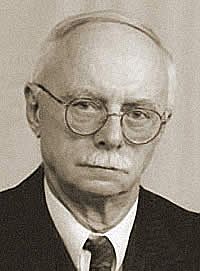
James Reaney
(September 1, 1926 - June 11, 2008)
poet and dramatist via Rob Mclennan
_______________________
The Concept of Kenneth Goldsmith
John Latta
Isola di Rifiuti
I’d say Kenneth Goldsmith is a kind of money, with precisely the moral dimension of money. It’s a gay day in paradise when one is so blithely ready to see the world turn’d to nothing beyond a pile of info-pixels, all, apparently, equal, each “white as a whore, an abstraction, a politician.” Stuck in a continuous use policy of whatever “noise” comes down the pike (distinction-making and agency verboten, Herr Commandant—“byte macht frei”)—all of it turning into a kind of slurry, a porridge keeping nobody and nothing afloat (except for Kenneth Goldsmith, bouncing along in the gooey muck of it, a cork, a corker, a narcissist, a playa). It’s all rather akin to the hula-hoop craze of 1958, or the cabbage patch kids, adorable crud to keep one’s mind off any honest-to-God problem in the world....(more)
_______________________
Nonconceptualist Manifesto Part I
K. Silem Mohammad
limetree
_______________________
Hallelujah, I’m a Bum!:
Utah Phillips and the Spirit of Resistance
Mark Andrew Huddle
Bruce Duncan "U. Utah" Phillips, anarchist, pacifist, folksinger, songwriter and agitator, died May 23rd of congestive heart failure at his home in Nevada City, California. Phillips's passing garnered it's fair share of notice in daily papers across the country. These remembrances ran briefly through Phillips's biography, mentioned the traumas of his military service, and his redemption after an encounter with the Catholic anarchist, Ammon Hennacy, and the Catholic Worker movement. These brief mentions of Phillips's radicalism-which often took on a bemused tone-were usually followed by extended, rhapsodic descriptions of his place in the folk world where he often sang old Wobbly tunes, railroad songs and told stories of American working-people, many of which he collected in his journeys around the country.
Unfortunately, very few of these obituaries have tried to assess Utah Phillips’s place in the recent history of the anti-authoritarian left and the critical role that the troubadour played in bridging the generational gaps between Old Left, New Left, and the more recent anti-globalization movement that has done so much to reshape the left political narrative since Seattle. Phillips’s life and work was defined by an anarchism that drew from the history of the “toiling masses” and also the grassroots engagements of the current generation of activist. By performing songs and telling stories of obscure strikes, train derailments, and coalmine disasters and weaving them into the fabric of contemporary struggles, Phillips spread a spirit of resistance that connected old IWW organizers, radical pacifists, draft resisters, and civil rights workers to the punk rockers, environmental activists and culture-jammers of the present....(more)
_______________________

arcadia
Andreas Meichsner
_______________________
Reflections on David Sirota’s The Uprising
Joseph Danison
David Sirota’s new book, The Uprising, describes itself as “An Unauthorized Tour of the Populist Revolt Scaring Wall Street and Washington”. I was unaware of this populist revolt. As a populist myself, I was naturally curious because I don’t relish being on the endangered species list. Had the movement started without me? (....)
The progressive tries to game a rigged system to work in the people’s interest. He’s a true Sisyphus. His chance of getting that stone over the top and achieving a permanent state of popular political control is slim to none. The populist wants to fundamentally change the system, eliminate that insuperable mountain, that is, de-privatize it, so that it operates in the interest of the general Welfare. It currently does not, nor will it ever do so, so long as the money power is in private hands.
A populist, as opposed to a progressive, is therefore in our day, a de facto revolutionary because only a revolution can wrest the money power from private hands and return it to popular control as prescribed in the Constitution, Article 1, Section 8...(more)
_______________________
How Class Works
Richard Hoffman (Mnemosyne's Memes) reports on the How Class Works conference, Suny Stonybrook, June 6, 2008 the very example of the free exchange of ideas, the generous give and take of researches, and the common struggle to articulate social and political dynamics that are for the most part kept hidden in a cloud of distractions, disinformation, and ahistorical versions of reality.
and provides his intensely personal and deeply moving presentation at that conference:
Thomas McGrath was right when he said to make a real revolution you have to take back the dictionary! Class has been defined nearly out of existence, the same way that racism was reduced to “being prejudiced” or misogyny to discussions of gender-free pronouns or of the glass ceiling.(....)
Outside the classroom, at my desk, I am trying to follow Baldwin's injunction and write of the lives of the people who produced me. Like the biblical dog who returneth to his vomit, I've come back to what I failed to digest: that the fact of class, its values and understandings, has always been there. And as I try now, white-collar working class in the Bush economy, to bring this into focus, I find myself goaded by a question: Is there an occult calculus by which those whose obscene fortunes leech their wealth from those below and replace it with coffers of shame exactly commensurate with the abundance they have stolen? And if so, how can I - in poems, stories, and essays - apprehend it and portray it clearly?...(more)
_______________________
 Paul and Grace Bransom
ca. 1915
A Thousand Kisses:
Love Letters from the Archives of American Art
via Ordinary finds

time standing still
Alexey Titarenko
1 2 3 4
_______________________
The Shropshire Schizoid And The Machines Of Modernism [PDF]
Ed Comentale on A. E. Housman, D. H. Lawrence, Wyndham Lewis and Deleuze / Guattari
Modernist Culture Vol. 1 (1)
Is there any modernist scholarship that is not born of frustration? Can today’s criticism achieve anything more than the feeble comforts of correction, recovery, and revision? Must we always pretend to ape the moderns, finding in their own discarded poses the suitable guises and stances for our careers? (...)
Bad daddy/good mommy or warm papa/cold mother – it doesn’t matter - this modernist machine can only do one thing. Its dimensions are standardized; its gears have been locked; its flows proceed efficiently, and profitably (at least for some). Indeed, today’s modernism functions according to a series of politicized binaries that the moderns themselves never wholly accepted (center/margins; father/mother; fascist/democratic; semitic/anti-semitic, etc.). It erects an illusional series of guideposts that distorts the historical landscape and misrepresents the desires of those who inhabit it, locking all into an Oedipal play of authority and alterity. Yes, in our work, the modernists appear as so many clumsy dolls. They are not simply stiff, but animatronic, appearing to couple and hump on their own. The drama we make them enact is infantile, boring - nothing more than a dress-up - and a lame economy of identity and expression neutralizes the explosive dimensions of their work. We’d like to imagine that this drama opposes the inherent fascism of the period, but without ever understanding the economies of totalitarianism, without ever looking beyond the family romance, we effect a coercive relation to the past and thus to our own work, restricting and channeling its truly revolutionary potential. By never seriously questioning the logic of paternalism, never moving beyond the simple impulse of political inversion, we are not allowed to see modernism as it wants to be seen, as a form of liberated desire, as an affective gesturalism, as a passionate enactment. Indeed, to look beyond Oedipal modernism, as Gilles Deleuze and Felix Guattari knew, is to reconceive cultural analysis itself as a kind of impassioned engineering, with the writer-critic allowed to tinker with his materials, working through all kinds of sign-machines, soldering and smelting away at poems, speeches, and other substantial dynamos. Ultimately, though, as “literary sons and daughters,” in our neurotic response to the past, we erect a quasi-intellectual bulwark against our own modernism, against our own desire; in the name of anti-fascism, we defend an economic that is just as horrifically final.
My language here is unforgivably rooted in the polemic of Anti-Oedipus , but it is also abashedly modernist in its embrace of the explosive energy and polyvocal complexity of dernity at large. My aim in this essay is to show what happens when we consider modernism in terms of its production rather than its consumption, when we consider desire as a single fluid capable of multiple forms and thus discard the entire apparatus of desire as founded upon lack. Modernist Culture
_______________________
"Depression is a wimp of a word for a howling tempest in the brain."
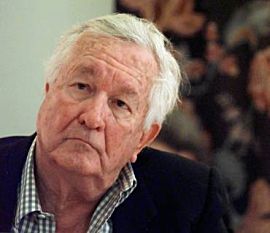
William Styron
June 11, 1925 – November 1, 2006
photo by Kathy Willens Darkness Visible: A Memoir of Madness
amazon link
_______________________
Imaginary Maps, Global Solidarities
Brian Holmes
My conviction is that we need radically inventive maps exactly like we need radical political movements: to go beyond received ideas and orders, in fact, to go beyond representation, to rediscover and share the space-creating potentials of a revolutionary imagination. In the thoughts and images gathered in these pages you will find an extensive, intensive and sometimes borderline-delirious exploration of the ways that maps allow us to constitute an image of the world, to move through the physical world that confronts us, and to exchange our worldviews and our experiences with the others whose solidarity we depend on.
Where do maps meet the intricacies of minds, bodies, aspirations? The interaction between mental conceptions and graphic representations can be studied beneath the heading of "cognitive cartography." ...(more)
_______________________

Jeannette Rankin
June 11, 1880 - May 18, 1973
First Woman Member of the U.S. Congress
Jeannette Rankin Foundation
Jeannette Rankin Peace Center
Education and Action for Non-violence, Social Justice and Sustainability
_______________________
The Empire -- A Status Report
William Blum
There are a number of expressions and slogans associated with the Nazi regime in Germany which have become commonly known in English.
"Sieg Heil!" -- Victory Hail!
"Arbeit macht frei" -- Work will make you free.
"Denn heute gehört uns Deutschland und morgen die ganze Welt" -- Today Germany, tomorrow the world
But none perhaps is better known than "Deutschland über alles" -- Germany above all.
Thus I was taken aback when I happened to come across the website of the United States Air Force -- www.airforce.com/ -- and saw on its first page a heading "Above all". Lest you think that this refers simply and innocently to planes high up in the air, this page links to another -- www.airforce.com/achangingworld/ -- where "Above all" is repeated even more prominently, with links to sites for "Air Dominance", "Space Dominance", and "Cyber Dominance", each of which in turn repeats "Above all". These guys don't kid around. They're not your father's imperialist war mongers. If they're planning on a new "thousand-year Reich", let's hope that their fate is no better than the original, which lasted 12 years. ...(more)
_______________________
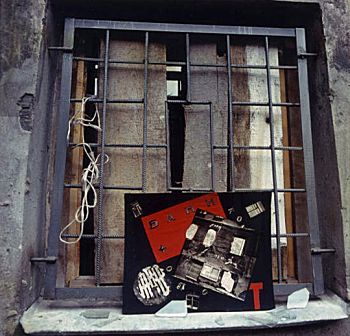
nomenklatura of signs
Alexey Titarenko
 waiting
photo - mw
_______________________
from Elephant & Obelisk
Tony Tost
& selfhood begins with a song
a sudden irruption historicizes the divine
the poem’s knot disappears
only to determine
which of my contemporaries I am to walk among
looking into the wolf’s eyes
approaching the self in victory
fearful
singing by the light snow’s subtle
series of heavenly bodies
the kiss of origination begins in doubt
ends with my tongue in your mouth
getting to know your name
each angelic immersion
a vision & not
only the suggestion of what one is carried with
a whisper and/or the song of what I am
...(more)
Front Porch 7
_______________________

Stephen Shore
1 2 3 4 5 6
A Conversation with Stephen Shore
Darius Himes
... there may be a difference between “withholding judgement” and an “arrest of interpretation.” There may be interpretation without judgement, even though everyone knows that an artist can’t be fully objective, and that my framework of understanding governs what I find and therefore what I show you. But even accepting that, there’s a difference in emphasis with a judgement. I think it has to do with a couple things. One, as I said, is temperament. When I see people being judgmental, I often back off. The other thing is that most judgements dismiss the complexities of reality. At least to my eyes. But I’m also deeply interested in showing something of our time. So that it’s not just aiming a camera at the world; there is an interpretation. I’m looking at things and thinking. There is a quote from Hamlet that, as the decade progressed, took on more and more significance for me. It’s from the acting lesson that Hamlet gives. He states that one of the purposes of acting is to show the “very age and body of the time his form and pressure.” I would just say that over and over again. What does this mean? To show the very age and body of the time, his form and pressure.”
Stephen Shore in conversation with Jörg Colberg
_______________________
Click here to disappear: thoughts on images and democracy
David Levi Strauss
open democracy
Photography has always had the potential to democratise images, but it has seldom worked out that way in practice. Digital imaging has made image-making devices ubiquitous. Many more people now possess the means to make images more of the time. At the same time, images are primarily used, in the public image environment, to influence public opinion and encourage the consumption of products and services. What is the relation between these two phenomena: near universal private image-making capability and widespread manipulation through public images?(....)It seems that it's possible to make images as unconsciously as one consumes them, bypassing the critical sense entirely. One of the main culprits here is time pollution, or "the pollution of temporal distance" that Paul Virilio writes about. To regain our liberty (and our distance), we must slow the images down....(more)via
_______________________
Are photographers really a threat?
Bruce Schneier
The Guardian
Given that real terrorists, and even wannabe terrorists, don't seem to photograph anything, why is it such pervasive conventional wisdom that terrorists photograph their targets? Why are our fears so great that we have no choice but to be suspicious of any photographer?
Because it's a movie-plot threat....(more)
via Jim Johnson
_______________________

Stephen Shore _______________________
Friendship
Maurice Blanchot
translated by elizabeth Rottenberg
download here
Translating
The translator is a writer of singular originality, precisely where he seems to claim none. He is the secret master of the difference of languages, not in order to abolish the difference but in order to use it to awaken in his own language, through the vioent or subtle changes he brings to it, a presence of what is different, originally, in the original. It is not a question here of resemblance, Benjamin rightly says: if one wnats the translated work to resemble the work to be translated, there is no possibile literary translation. It is much more a question of an identity on the basis of an alterity (....)
Yes, the translator is a strange man, a nostalgic man, who feels, as lacking in his own language, all of what the original work (that he cannot, moreover, fully attain, for he is not at home in it; he is the eternal guest who does not inhabit it) promises him in present affirmations.
_______________________
 Stephen Shore

Le Grand Dessinateur
Jacques Villon
(Gaston Duchamp)
1875 - 1963
_______________________
Either You're With Us and Against Us:
Charles Bernstein's Girly Man, 9-11, and the Brechtian Figure of the Reader
Tim Peterson
electronic book review
Now I am getting weary of ideology and would like to give it up entirely but it seems the more I give it up the more it has me by the throat. I write so I can breathe.
Or let's say trying to re-imagine the possibilities of sentience through the material sentience of language.
Don't ask me to be frank. I don't even know if I can be myself.
("Sign Under Test")
In this poem the leaps between sections represent a kind of note-taking rather than a collage in the sense of the earlier work. The troubled, haunted utterances come from one speaker who appears at times to be addressing himself, at times talking to someone else. There is no over-arching rhetorical perspective or implied reader supplying a Brechtian critique in the earlier sense of The Threepenny Opera. If there is a Brechtian aspect here, it would be more redolent of something like the Brecht who wrote Galileo, the (rewritten) last scene of which portrays the protagonist at once angered at being silenced by the papacy and troubled by his own discoveries and the role they have in creating a notion of "progress:"
Threats and bribes fill the air. Can the scientist hold out on the numbers? For what reason do you labor? I take it that the intent of science is to ease human existence. If you give you way to coercion, science can be crippled, and your new machines may simply suggest new drudgeries. (Galileo, 123-124)
The diminished role for sarcasm in Bernstein's work evokes a similar kind of troubled sadness. In the spirit of Butler's comments about hystericization, it is harder "to be frank" when one is compelled to respond to ridiculous ultimatums such as "Either you're with us or you're with the terrorists." While Bernstein's older work saw the ironic anti-absorptive as a way to evade commodification, it is no longer necessarily possible to accomplish this when everyone is Brechtian. Rather, in this new book there is a certain attempt at sincere communication of a multitude of ideas. The strategy has become a mobile, localized questioning of what values are in operation from moment to moment....(more)
.....................................................
A Do-It-Yourself Guide to Digital Poetics
Michael McDonough reviews Brian Kim Stefans' Before Starting Over
ebr
_______________________
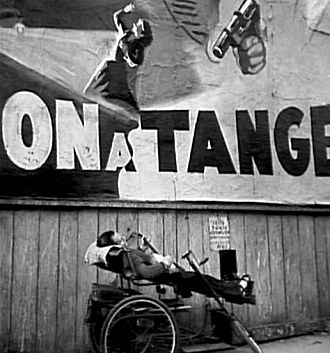
Ed Van Der Elsken
1925-1990
_______________________
Giorgio Agamben And The New Biopolitical Nomos
Claudio Minca
download here
Starting from Agamben’s spatial conceptualizations, I explore his attempt to trace the contours and the secret coordinates of the contemporary biopolitical nomos, a nomos rooted firmly in the crisis and progressive demolition of that which Carl Schmitt described as the ius publicum Europaeum. I note, moreover, how the definitive dissolution of the geographical nomos that had dominated the two centuries preceding the First World War, and the lack of a new, alternative, geographical nomos in the century which followed, can also be grasped by critically rereading some key episodes in the history of European geography; in particular, the contested legacy of the work of Friedrich Ratzel’s grand geographical project and the Geopolitik experiment.
What I suggest is that to understand the deep nature of the geographies of exception that arm the global war on terror, it is vital that we think in terms of a theory of space in order to try to unveil the arcanum, the secret enigma of the empty centre around which turn the wheels of a new, macabre, geo-biopolitical machine. _______________________

The workings of the nervous system
Fritz Kahn's body machines
_______________________
from
Earthworm
Louise Glück
And yet
to walk on top of a thing is not to prevail over it—
it is more the opposite, a disguised dependency,
by which the slave completes the master. Likewise
the mind disdains what it can’t control,
which will in turn destroy it. It is not painful to return
without language or vision: if, like the Buddhists,
one declines to leave
inventories of the self, one emerges in a space
the mind cannot conceive, being wholly physical, not
metaphoric. What is your word? Infinity, meaning
that which cannot be measured.
electronic poetry review
_______________________

photo - mw
_______________________
Working
Mark Nowak
Harriet
Walk into any Target, Dollar General, Aldi, Taco Bell, or any of the other countless workplaces in the service sector strips that repeat themselves, ad nauseam, across the American landscape, and look at the workers, particularly the adult workers, those people trying to raise families or trying to supplement their (meager or lost) retirement, those just trying to survive, and ask, "What is the relationship between what (my) poetry has to say and her? And him? And them? (And us?)"
_______________________
Breaking the Beer Barrier
Frank Paynter reports from the National Conference on Media Reform
Joe Bageant
" Why can’t progressive media ever learn to communicate in redneck and born again bubba? I would guess that a lot of you are thinking, “Why would anybody want to?” One answer is the election of George Bush — but there are many others.(....)
... just telling our own truth to people who already agree with us isn’t going to do anything, regardless of our illusions about the power of the “blogosphere,” etc. As Bill Moyers said last year at this conference, despite all the new information platforms, cable, the Internet, blogs, podcasts, YouTube and MySpace — our resources for collective understanding as Americans are contracting, not expanding. To make matters worse, we progressives use these resources to talk to one another in a closed conversation, instead of reaching all the people."...(more)
_______________________
"Precarious Labor: A Feminist Viewpoint"
Silvia Federici
Interactivist Info Exchange
Precarious work is a central concept in movement discussions of the capitalist reorganization of work and class relations in today’s global economy. Silvia Federici analyzes the potential and limits of this concept as an analytic and organizational tool. She claims reproductive labor is a hidden continent of work and struggle the movement must recognize in its political work, if it is to address the key questions we face in organizing for an alternative to capitalist society. How do we struggle over reproductive labor without destroying ourselves, and our communities? How do we create a self-reproducing movement? How do we overcome the sexual, racial, and generational hierarchies built upon the wage?
This lecture took place on October 28th 2006 at Bluestockings Radical Bookstore in New York City, 172 Allen Street as part of the “This is Forever: From Inquiry to Refusal Discussion Series. “...(more)
_______________________
 photo - mw
_______________________
from
The Ultimate Land
Levent Yilmaz
translated from the Turkish by Ünal Aytür
drunken boat
For a time,
a causeless cry gets locked in his mouth,
it leaks through the lock of his teeth, but falls prisoner to tight shut lips.
If lack of voice means non-existence,
what about his thoughts, those voiceless thunderbolts, don’t they exist likewise?
A lukewarm wind makes him shiver again.
With roar and chirp, life is putting up a fight against the silence
that denies it existence.
A salley bows to the ground.
He tries to walk through the dust,
earth and sky merge,
life advises him to protect himself, to run,
and to make a bouquet out of the signs flying about.
Has he understood?
Those awkward sentences he’s constructed, can they be read in his eyes in future?
Behind words, sentences, and voices there’s a world;
tell him to communicate with it.
That dream surrounding the world, may it be broken,
and may voice take on matter...
May signs finally get reborn and merge with substances...
If only this ultimate and which they say is not for him was his land;
If he could touch words here, take them in his hand and fling them
towards moonlight, he would attain language; he could be daring, he
could be lost.
Will he be clever enough to say, love is to understand.
...(more)

The Opera of the Sea
Charles Rennie Mackintosh
_______________________
Thirteen Ways of Looking at Joseph Brodsky
Valentina Polukhina
a synthesis of those interviews compiled by Cheryl Olsen
words without borders
_______________________
Natasha
Vladimir Nabokov
(Circa 1924. Translated, from the Russian, by Dmitri Nabokov.)
new yorker
_______________________
Reading McCaffery: A discussion of Seven Pages Missing, Vol. 1
Christine Stewart and Ted Byrne (2002)
What Roland Barthes, in The Pleasure of the Text, calls “the corporeal exteriorization of
discourse,” is when the text does not attempt to express a clear message or a “theatre of
emotions.” This provokes what he calls “pulsional incidents”. These are linguistic
occasions where language points to the thick skin of its own materiality; that is to its sonic,
and rhythmic qualities. Barthes refers to this as “writing aloud” (66). In writing aloud the
text works to evoke “the grain of the throat, the patina of consonants, the voluptuousness of
the vowels, a whole carnal stereophony.” This writing aloud manifests what Julia Kristeva
refers to as the semiotic aspects of language. This includes its rhythmic qualities, its
contradictions, meaninglessness, disruptions, silence and absence. According to Kristeva,
poetic language is writing that illuminates the material qualities of language and its
expressions. The material aspects of language – tone, rhythm etc. – are its semiotic
aspects. These aspects are irrepressible and work to destabilize the symbolic signifying
process. This gives them their disruptive, even revolutionary potential.
For Kristeva the semiotic aspects of language are the manifestations of the instinctual,
unconscious drives of the irrepressible pre- and anti-symbolic body. Kristeva’s le
sémiotique refers to the organization within the body of its instinctual drives as they affect
language and its practices (see Leon Roudiez’ Introduction to Desire in Language). This is
also true for Barthes. In The Pleasure of the Text the stereophonic quality of the text is
opposed to the symbolic process of signification. That is, the semiotic is opposed to
language and meaning. This notion of “meaning” is what Derrida calls the classical idea of
meaning – the idea is that it is possible to affix a stable meaning in a particular linguistic
configuration.
My question is this: Is this McCaffery’s take? And if so, what of such distinctions between
the symbolic and the semiotic, between meaning and the materiality of language?...(more)
The Poetic Front
Vol 1, No 1 (2008)
_______________________
A Thousand Years of Nonlinear History
Manuel de Landa
download here
_______________________

At the Edge of the Wood
Charles Rennie Mackintosh
1868 - 1928
_______________________
Politics, why and why not?
Corky Evans
kootenay activist
I was raised in a country, the United States, where to say you are a socialist is to so limit your career options that nobody would vote for anybody stupid enough to make such a statement. Imagine my surprise and wonder when I found myself living in a country where socialists not only say what they believe but sometimes win and, once and a while, in the odd Province, even govern.
I think my wife, Bonnie, and I joined the NDP for the first time on the day we became citizens. We found out later that a person is welcome in the Party as a Landed Immigrant or as a Refugee, but we wouldn’t have joined prior to becoming citizens even if we had known the rules. It takes a goodly number of years living in this country to lose the notion that a person might be denied citizenship for the crime of calling yourself a socialist, a social democrat, or (as some purists like to say) a democratic socialist.
So the first good reason to believe in the idea of democratic participation is just to prove to yourself that you can. Even if you don’t believe in any of the parties, I think everyone should join one at least once in their lives to have the experience. To see who cares and who doesn’t. To make it easier for someone else to care. To make it harder for someone to take that right and privilege away. To keep the option of caring open for your children. To find out if they steal.
I think I should admit that after a decade or two in public office and a lifetime in the NDP I think that lots of what we think and say is no longer true or never was true or is only one of a variety of truths worth discussing. I want to do this because I do not want to leave this work having failed to test the boundaries of acceptable discourse. I want to challenge that part of my Party (every Party has one) that mistakes the movement for a church and the ideas of the leadership, present and historical, for a Bible....(more)
via Terry Glavin
_______________________
JSTOR, get out of the way
Grant McCracken
The fact of the matter is JSTOR is holding precious resources captive to sustain itself...and its ability to hold precious resources captive. This content was created by academics funded by not-for-profit institutions. JSTOR is not reinvesting revenue in academic production. It is, as I say, now self sustaining in the worst sense of the term.
JSTORE is taxing public knowledge in order to sustain its ability to block access to public knowledge.
Time to let go.
via Tom Matrullo

School of Agriculture in Tábor
Šechtl & Vosecek Museum of Photography _______________________
Out of Place
Corey Robin
Making privilege palatable to the democratic masses is a permanent project for conservatives, but each generation must tailor it to the contours of its times.
_______________________
Nettles for the fire
Don Share
Squandermania and other foibles
Whilst birding (if you can call wandering around an urban bird sanctuary birding) with Gary Snyder, he and I chatted briefly about Bunting and Pound, which led him to remark in mock bemusement, "I'm just now discovering that The Cantos was a flawed poem!" And then more seriously that though many folks assume he got his monosyllabic prosody from Asian-language poetry (which he studied), in fact he got it from Pound. (I've always thought Frank Sinatra to be the 20th-century master of monosyllabic prosody, but that's a subject for another day.)
Where poets get things from is not usually a great mystery. For about three years, I scrutinized the books we know that Basil Bunting had owned, and sure enough, they document that his influences were precisely what he said they were. Many poets are trickier than that, needless to add (though Bunting was quite a trickster himself in many ways), but even possum-Eliot isn't very mysterious. When he promulgated that business about the escape from personality, he was partly channeling his Unitarian roots - and his poetic ones, too: Coleridge, in a letter, assured a correspondent that he was the "first man, from who I heard that article of my Faith distinctly enunciated, which is the nearest to my Heart, the pure fountain of all my moral & religious Feelings & Comforts - I mean the absolute Impersonality of the Deity." Of course, both Eliot and Coleridge changed their religious views, becoming more, as it were, conservative (or, you might say, traditional) - but their work records this as a struggle....(more)
_______________________
This Ecstatic Nation
Learning from Emily Dickinson after 9/11
Maureen N. McLane
Boston Review
I began to consider this question after returning to Susan Howe’s My Emily Dickinson, her kaleidoscopic, deeply researched, brilliantly written 1985 tour-de-force, which has been reissued with a new introduction by Eliot Weinberger.
Weinberger calls My Emily Dickinson a “classic” of “avant-gardist criticism,” and he invokes a lineage of poets’ criticism extending from William Carlos Williams (In the American Grain) to Charles Olson (Call Me Ishmael) to “Susan Howe herself, the most Americanist of American poets.”
Howe’s book is simultaneously a dazzling exploration of Dickinson’s power and an anatomy of the American cultural imaginary. “The vivid rhetoric of terror,” Howe writes, “was a first step in the slow process of American Democracy.” This rhetoric of terror—fueled by a double legacy of Calvinist predestinarianism and violent frontier experience—animates some of Dickinson’s best work....(more)
_______________________
On the Poverty of Internet Life: a Call for Poets
Jasper Bernes
6.2 While the list-servs and blogs, low overhead internet magazines, desktop publishing and the falling cost of print publications have done much to vent some of the excessive energy among poets, and to create multiple, overlapping models of distribution in which work that otherwise might never have been seen finds readers, and in some cases, finds many, many readers, although this has been a fortuitous and powerful occurrence, two things must be kept in mind: 1) it will not last 2) no-one but poets care or know.
7.2 To my disgusted and enraged fellow poets who seek, like me, to confront the blood-soaked juggernaut of capitalism in its delirium tremens of addiction to surplus value, I say this: let’s continue doing what we are doing now—writing, posting to blogs, giving readings, publishing books. But let’s also devote some small portion of our energy to using our creative skillz for the injection of radical content into the public sphere at large—that is, the land-based public sphere. Perhaps this work would not be poetry qua poetry, since it is obvious to me at least that poems, frequently belonging to a different temporal order than politics, often do their most powerful political work (at least at the level of producing politicized knowledge) precisely by refusing the demand that they be political. I suspect, too, that to call something like this poetry or art from the outset often might limit its effectivity, and capitulate without struggle to the hardening effects of the commodity. But it would be words, something that poetry knows much about. It would be an improvement of, or de-sterilization, or re-politicization of public language. At one level, this might involve something as simple as the public service of improving the quality of bathroom, bus or subway graffiti. Or artfully replacing all of the newspapers at the newspaper stand. Or improving the nearest, and most painfully offensive, billboard. Credit card ads and military recruitment posters are good. The creative uses of yellow caution tape remain to be explored, in the constuction of detours leading to a sort of car-wash of the mind. Or campaigns for non-existent or dead people. Or for corporations. Home Depot for President, for instance....(more)
Aggression
A Conference On Contemporary Poetics And Political Antagonism
_______________________
 photo in HARP
.....................................................
Leonard Cohen Interview
Sambhala Sun
I always felt it was of one piece. I never felt I was going off on a tangent. Mainly because I think we develop images of ourselves quite early on, and certainly one of the images I had of myself came from reading Chinese poetry at a very young age. There was a kind of solitary figure in some of those poems by Li Po and Tu Fu. A monk sitting by a stream. There was a notion of solitude, a notion of deep appreciation for personal relationships, friendships, not just love, not just sensual or erotic or the love of a man or a woman, but a deep longing to experience and to describe friendship and loss and the consequences of distance. So those images in those poems had their effect, and thirty years later, I found myself in robes and a shaved head sitting in a meditation hall. It just seemed completely natural(....)
What happens in meditations that last ten, fifteen hours is that you run through your top ten erotic fantasies, ambition fantasies, revenge fantasies, global ratification fantasies. You run through them all until you bore yourself to death, basically, and the faculty that produces opinions and snap judgments and unrealistic scenarios for your own prominence, after you run through them for a number of years, they cease to have charge. They bore themselves into non-existence. You see them as diversions from another kind of intimacy that you become more interested in—and that is what Socrates said: Know Thyself.”...(more)
via NewPages Blog

The Roma Journeys
Joakim Eskildsen
via gmtPlus9 (-15)
_______________________
... the Book of Revelation, the final book of the Bible, and perhaps its most bizarre, certainly one of its most lurid, remains important in the United States, just as it once was in medieval Europe.
The day of judgment
Ian McEwan The Guardian
Contemporary apocalyptic movements, Christian or Islamic, some violent, some not, all appear to share fantasies of a violent end, and they affect our politics profoundly. The apocalyptic mind can be demonising - that is to say, there are other groups, other faiths, that it despises for worshipping false gods, and these believers of course will not be saved from the fires of hell. And the apocalyptic mind tends to be totalitarian - which is to say that these are intact, all-encompassing ideas founded in longing and supernatural belief, immune to evidence or its lack, and well-protected against the implications of fresh data. Consequently, moments of unintentional pathos, even comedy, arise - and perhaps something in our nature is revealed - as the future is constantly having to be rewritten, new anti-Christs, new Beasts, new Babylons, new Whores located, and the old appointments with doom and redemption quickly replaced by the next.(....)
In general, belief in end-time biblical prophecy, in a world purified by catastrophe and then redeemed and made entirely Christian and free of conflict by the return of Jesus in our lifetime, is stronger in the United States than anywhere on the planet and extends from marginal, ill-educated, economically deprived groups, to college-educated people in the millions, through to governing elites, to the very summits of power. The social scientist JW Nelson notes that apocalyptic ideas "are as American as the hot dog"....(more)
The day of judgment, part twoIan McEwan
_______________________
Post-Rapture E-Mail to Friends 'Left Behind'
For just $40 a year, believers can arrange for up to 62 people to get a final message exactly six days after the Rapture, that day when -- according to Christian end times dogma -- Christians will be swept up to heaven, while doubters are left behind to suffer seven years of Tribulation under a global government headed by the Antichrist."In the encrypted portion of your account you can give them access to your banking, brokerage, hidden valuables, and powers of attorneys," the site says. "There won't be any bodies, so probate court will take seven years to clear your assets to your next of kin. Seven years, of course, is all the time that will be left. So, basically the Government of the Antichrist gets your stuff, unless you make it available in another way."
_______________________
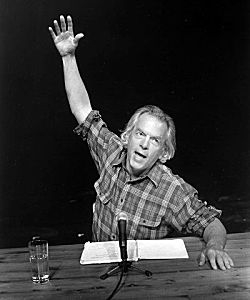
Spalding Gray
(June 5, 1941 – ca. January 10, 2004)
photo by Paula Court
Spalding Gray’s Last Interview
Theresa Smalec
PAJ: A Journal of Performance and Art Jan 2008, Vol. 30, No. 1
_______________________
from
City That Does Not Sleep
Federico García Lorca
(June 5, 1898 - August 19, 1936)
Translated by Robert Bly
Nobody is sleeping in the sky. Nobody, nobody.
Nobody is sleeping.
If someone does close his eyes,
a whip, boys, a whip!
Let there be a landscape of open eyes
and bitter wounds on fire.
No one is sleeping in this world. No one, no one.
I have said it before.
No one is sleeping.
But if someone grows too much moss on his temples during the
night,
open the stage trapdoors so he can see in the moonlight
the lying goblets, and the poison, and the skull of the theaters.
...(more)
_______________________

"The Lams of Ludlow Street"
Thomas Holton
via Heading East
_______________________
The Liberalizing Ideology of the Internet
Jasper Bernes
written for AGGRESSION conference, Small Press Traffic, 5/31
At first, I think to write something about poetry in public space and my researches into the theory and practice of the Situationist International, but I’m feeling the hate, I’m liking the hate, I have all of this aggression that’s bottlenecked because it’s supposed to fit through these tiny pixel-sized perforations, and increasingly, what I find impossible to stomach is this idea that the internet is a democratic space, that the technology is democratizing, anti-hierarchical, equalizing, when it seems clear to me that alongside the surge of troops into Iraq, also under the pretenses of democracy, there is a surge of voltages into the space of the internet, and that, instead of one surge stopping the other surge, they are mutually enabling surges, they are pals, these surges, and contrary to predictions about new media enabling new forms of resistance, the internet has, mostly, become, like, a giant deterrence machine, virtualizing and disembodying resistance, it is something like the Free Speech zones set up at protests and on campuses, a merely formal space of freedom surrounded by massive unfreedom, and because I read a good number of books about capitalism, this seems like an old story, this one about freedom and unfreedom, and I want to tell it....(more)
_______________________
An Oral History of the Internet
Keenan Mayo and Peter Newcomb
vanity fair
This year marks the 50th anniversary of an extraordinary moment. In 1958 the United States government set up a special unit, the Advanced Research Projects Agency (arpa), to help jump-start new efforts in science and technology. This was the agency that would nurture the Internet.
This year also marks the 15th anniversary of the launch of Mosaic, the first widely used browser, which brought the Internet into the hands of ordinary people.(....)
To observe this year’s twin anniversaries, Vanity Fair set out to do something that has never been done: to compile an oral history, speaking with scores of people involved in every stage of the Internet’s development, from the 1950s onward. From more than 100 hours of interviews we have distilled and edited their words into a concise narrative of the past half-century—a history of the Internet in the words of the people who made it....(more)
via Fimoculous
_______________________

Justin James Reed via Shane Lavalette
_______________________
The Caracas Speech
Roberto Bolaño
translated by David Noriega
The first complete English translation of the Chilean novelist's 1999 speech accepting the Rómulo Gallegos Prize.
The pataphysical academy teaches (and mysteriously, too) the science of imaginary solutions, which, as you all know, is that which studies the laws that regulate exceptions. And this shock in the order of letters is, in a sense, an imaginary problem that requires an imaginary solution.(....)
What’s true is that I am Chilean, and I am also a lot of other things. And having arrived at this point, I must abandon Jarry and Bolivar and try to remember the writer who said that the homeland of a writer is his tongue. I don’t remember his name. Perhaps it was a writer who wrote in Spanish. Perhaps it was a writer who wrote in English or French. A writer’s homeland, he said, is his tongue. It sounds a little demagogic, but I agree with him completely, and I know that sometimes there is no recourse left us but to get a little demagogic, just like sometimes there is no recourse left us but to dance a bolero under the light of streetlamps or a red moon....(more)
orbiting an absent programTriple Canopy Issue #2
_______________________

Joakim Eskildsen

May 1968
Marc Riboud
1 2 3 4 5
_______________________
The Quarterly Conversation
Summer 2008
Anne Waldman, Anselm Hollo, and the Authentic Avant-Garde
Essay by Ravi Shankar
Disassembling Donald Barthelme:
Flying to America's Unfortunate Disorganization
Essay by Dan Green
Nazi Literature in the Americas
by Roberto Bolaño
review by Nigel Beale
_______________________
What sphinx of cement and aluminum bashed open their skulls and ate up their brains and imagination?
Moloch! Solitude! Filth! Ugliness! Ashcans and unobtainable dollars! Children screaming under the stairways! Boys sobbing in armies! Old men weeping in the parks!
Moloch! Moloch! Nightmare of Moloch! Moloch the loveless! Mental Moloch! Moloch the heavy judger of men!
--
Allen Ginsberg, ''Howl!''

Cadets read Howl
February 19, 1991
Virginia Military Institute
Unknown Collaborators
Gordon Ball
jacket 'The Poem That Changed America: "Howl" Fifty Years Later'
Greil Marcus
.....................................................
The war is language,
language abused
for Advertisement,
language used
like magic for power on the planet
—Allen Ginsberg, Wichita Vortex Sutra [PDF]
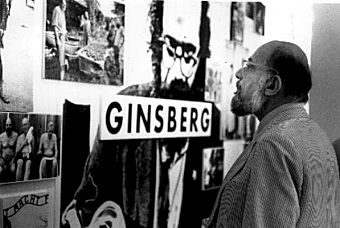
Allen Ginsberg
June 3, 1926 – April 5, 1997
In 1994, The Naropa Institute held a week long tribute for Allen Ginsberg entitled "Beats and other Rebel
Angels". One of the many events of the week was an exhibit of Allen's Photographic archives. In
attendance at the celebrations were: Anne Waldman, Gregory Corso, Lawrence Ferlinghetti, David
Dellinger, Michael McClure, Amiri Baraka, Phillip Glass, Ken Kesey, Jack Collom, Robert Creeley,
Marianne Faithful, Ed Sanders, Gary Snyder, Sharon Olds, Bobbie Louise Hawkins, Anselm Hollo, Keith
Abbot, Steven Taylor, Meridith Monk, David Amram and many other Beat dignitaries.
- source
_______________________
Howl, Parts I-III
I saw the best minds of my generation destroyed by
madness, starving hysterical naked,
dragging themselves through the negro streets at dawn
looking for an angry fix,
angelheaded hipsters burning for the ancient heavenly
connection to the starry dynamo in the machin-
ery of night,
who poverty and tatters and hollow-eyed and high sat
up smoking in the supernatural darkness of
cold-water flats floating across the tops of cities
contemplating jazz,
who bared their brains to Heaven under the El and
saw Mohammedan angels staggering on tene-
ment roofs illuminated,
who passed through universities with radiant cool eyes
hallucinating Arkansas and Blake-light tragedy
among the scholars of war,
_______________________

Washington, D.C.
1967
Marc Riboud
_______________________
I ask one officer how long it is going to take to make this new strategy bear fruit.
"Look," he says, "we're still in Germany and Japan 60 years after that war ended. That's how long it can take. I fully expect to have grandchildren who will be fighting out here."
Afghanistan: colonialism or counterinsurgency?Americans bring Afghans their new 60-year plan
Doug Saunders globe and mail
Here at the headwaters of the river, I felt I had encountered some latter-day Colonel Kurtzes, losing themselves in Cartesian twists of logic amid all the mud and dust.(....)
In the tents of Naray, I had the distinct feeling that I had strolled into Uttar Pradesh at some point after 1858, in the early days of the British Raj.(....)
Lest anyone think this is a soft or peaceful process, Cdr. Dwyer's base was rocked, every minute or so all day, by the terrifying shock of its line of 155-mm howitzers firing their village-destroying shells over the hills and into the Korengal Valley.(....)
The building of mosques and roads is matched with absolutely ferocious fighting in places such as Korengal — the Americans are much more willing to use air strikes and heavy artillery, with the resulting heavy civilian casualties, than other militaries.
There are good reasons to be suspicious of this approach....(more)
via mirabile dictu.....................................................
Who is the Enemy, Part II
Eric Walberg
The overwhelming legacy of the Soviet occupation of Afghanistan for Russia can be summed up in one phrase — drug addiction — something almost unknown to the Soviet Union, but which rapidly spread with Soviet soldiers returning in the 1980s from this culture where hashish is far cheaper and more readily smoked than tobacco, and opium poppies have long been cultivated uncontrolled. Hashish is widely used by Afghans, though not opium, which is for export or used medicinally. But when added to the chronic overuse of alcohol in Russia, drug use there soon became a crisis.(....)
The crisis of drug addiction in Russia, now compounded by the post-2001 explosion of opium and hashish flooding the federation courtesy of US/NATO-occupied Afghanistan, was in no small measure inspiration for this lashing out. The last thing Russia expected when it opened its arms to America was to see the Taliban’s zero-tolerance policy towards opium give way to a huge explosion of opium production and smuggling, presided over by US/NATO forces.(....)
“The Americans are working hard to keep narco business flourishing in both countries,” says Mikhail Khazin, president of the consultancy firm Niakon. “They consistently destroy the local infrastructure, pushing the local population to look for illegal means of subsistence. And the CIA provides protection to drug trafficking.” In March 2002 he told NewsMax.com, “The CIA did almost the identical thing during the Vietnam War, which had catastrophic consequences — the increase in the heroin trade in the USA beginning in the 1970s is directly attributable to the CIA.”...(more)
_______________________
"We Were Lied To"
James Howard Kunstler
This meme, which has been the mantra among supposed political "progressives" for years now, was reignited over the weekend with the publication of a memoir by former Bush press secretary Scott McLellan claiming that President Bush and his cronies wove a spell of lies to get a war in Iraq underway. This is the narrative that Americans tell themselves to prove that, if it weren't for bad leaders, we would be a morally upright nation.
I don't think so. And, remember, I write the following as a registered Democrat (and an Obama voter in my primary state). Warning: many readers are not going to like this....(more)
_______________________
U.S. Secret Prison Ships Hold Untold Number of Detainees
Michael Otterman
US Holding 27,000 in Secret Overseas Prisons; Transporting Prisoners to Iraqi Jails to Avoid Media & Legal Scrutiny
Clive Stafford Smith
_______________________
Poetry, Violence, and the Trembling Lambs
Allen Ginsberg's Independence Day Manifesto
first published in the San Francisco Chronicle, July 26,1959
How many hypocrites are there in America? How many trembling lambs, fearful of discovery? What authority have we set up over ourselves, that we are not as we are? Who shall prohibit an art from being published to the world? What conspirators have power to determine our mode of consciousness, our sexual enjoyments, our different labors and our loves? What fiends determine our wars?
When will we discover an America that will not deny its own God? Who takes up arms, money, police, and a million hands to murder the consciousness of God? Who spits in the beautiful face of poetry which sings of the glory of God and weeps in the dust of the world? ...(more)
Allen Ginsberg at PennSound and the Electronic Poetry Center.....................................................

Allen Ginsberg, William Burroughs, and Phillip Whalen
Naropa 1975
Photo by Rachel Homer
.....................................................
Cold War Correspondents:
Ginsberg, Kerouac, Cassady, and the Political Economy of Beat Letters
Oliver Harris
Twentieth Century Literature, Summer, 2000 .....................................................
We Rise On Sun Beams And Fall In The Night
Dawn's orb orange-raw shining over Palisades
bare crowded branches bush up from marshes--
New Jersey with my father riding automobile
highway to Newark Airport--Empire State's
spire, horned buildingtops, Manhattan
rising as in W. C. Williams' eyes between wire trestles--
trucks sixwheeled steady rolling overpass
beside New York--I am here
tiny under sun rising in vast white sky,
staring thru skeleton new buildings,
with pen in hand awake ...
-- Allen Ginsberg
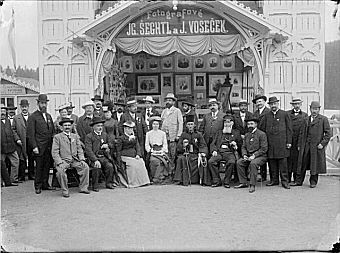
exposition 1902
Šechtl & Vosecek Museum of Photography
As at 2008-04-27 the digital archive currently contains 20067 records.
We are scanning approximately 50 photographs per week, and the online version of the archive is updated weekly.
via Mrs. Deane
_______________________
The Amazing Money Machine
How Silicon Valley made Barack Obama this year’s hottest start-up
Joshua Green
atlantic
The story of Obama’s success is very much a story about money. It provided his initial credibility. It paid for his impressive campaign operation. It allowed him first to compete with, and then to overwhelm, the most powerful Democratic family in a generation—one that understood the power of money in politics and commanded a network of wealthy donors that has financed the Democratic Party for years.
What’s intriguing to Democrats and worrisome to Republicans is how someone lacking these deep connections to traditional sources of wealth could raise so much money so quickly. How did he do it? The answer is that he built a fund-raising machine quite unlike anything seen before in national politics....(more)
_______________________
Who owns your social network profile?
An Interview with Marc Worrell
Ulises Mejias
_______________________
Gaming the Ghetto
Grand Theft Auto IV, Racist Media and the Concrete Jungle
Anthony Dimaggio
The controversy that has raged in the media over GTA has tended to ignore the most devastating critiques of the series put forward by progressives. Media outlets overemphasize the parochial, conservative debate over whether “video games cause violence,” while almost universally neglecting substantive critiques of corporate America for profiting from racist and ethnic stereotypes.
Games like GTA profit off of the ideological and physical segregation of Americans who are separated along class and color lines. Corporate media propaganda of cities and minorities, however, has not gone unnoticed in critical academic studies.(....)
The GTA series has excelled in promoting some of the most warped and grotesque images of minorities and American urban locales. In a time of increased segregation (within cities and suburbs) such hostile media depictions are likely to further consolidate racist and prejudiced preconceptions of minorities and the poor. Without direct, meaningful exchanges across class, color, and ethnic lines, citizens are unlikely to foster the civic ties needed to overcome the institutionalized racism so often seen in film, television, news, and video game culture....(more)
_______________________

Playing the Building
An Installation by David Byrne
photo © Justin Ouellette
via Shane Lavalette David Byrne’s New Band, With Architectural Solos
nyt
_______________________
What the Sky Is Like
Alpay Ulku
agni
Legend has it that the souls of paratroopers wander here, who stepped into the sunlight and understood everything.
_______________________
“I can never blame the Americans alone,” an Iraqi refugee named Firas told me in early 2007. “It’s the Iraqis who destroyed their country, with the help of the Americans, under the American eye.” To gain this wisdom, Firas had to lose almost everything. What would it take for Americans to understand what Firas already does? A recognition that Iraq was everyone’s loss, whichever side you were on.
Over Here: Iraq the Place vs. Iraq the Abstraction
George Packer
By the summer of 2003, when I first went to Iraq, it was clear that a void had opened up and the best-armed and most ruthless groups had moved in. Although it went through many phases and assumed a variety of forms, the process of mutual disenchantment between Iraqis and Americans began early. It was this process that interested me most about Iraq, because it went to the human heart of the matter: the experience of suffering, hope, illusion, need, violence, and disappointment that transformed both sides and made the war so painful for each.
These may be clichés for anyone who has spent much time in Iraq, or in any country at war. And yet here at home they have been almost impossible to convey. In the United States, the war is an abstraction that routinely shades into caricature.(....)
The Iraq War had its share of bad or indifferent journalism. But there was a huge distinction between the failure to expose the administration’s falsehoods prior to the war and the effort to report the truth in Iraq once it began. The press redeemed in Baghdad what it had botched in Washington. If the names of the war’s best reporters aren’t widely known today and will never be recalled alongside their legendary predecessors in Vietnam, it’s partly because the public—especially the portion of it that generates and consumes opinion on a regular basis—is less susceptible to the power of complex facts than it was in 1963....(more)
World Affairs Journal Spring 2008
via 3quarksdaily
_______________________
What the U.S. Wants in Afghanistan
Eric Ruder
George Bush and the Pentagon are currently weighing a “surge” of two additional brigades–about 7,000 troops–to Afghanistan. The Democrats’ likely presidential nominee Barack Obama has repeatedly spoken in favor of sending more troops to Afghanistan–he calls the occupation of Iraq a “distraction” from the war the U.S. should be fighting.
The level of death and destruction in Afghanistan, combined with the horrible toll that the war has exacted on U.S. soldiers, including those who return alive but forever scarred by the stress of combat, should be reason enough to oppose the war in Afghanistan.
But this is only a starting point. If you look more closely at what the U.S. has done in Afghanistan and plans to do in the future, it’s clear that the rhetoric about upholding democracy and making the world safer is–as in Iraq–a smokescreen to justify pursuing imperial ambitions....(more)
_______________________

Thomas Hardy
June 2, 1840 - January 11, 1928
A Commonplace Day
Thomas Hardy
The day is turning ghost,
And scuttles from the kalendar in fits and furtively,
To join the anonymous host
Of those that throng oblivion; ceding his place, maybe,
To one of like degree.
I part the fire-gnawed logs,
Rake forth the embers, spoil the busy flames, and lay the ends
Upon the shining dogs;
Further and further from the nooks the twilight's stride extends,
And beamless black impends.
Nothing of tiniest worth
Have I wrought, pondered, planned; no one thing asking blame or
praise,
Since the pale corpse-like birth
Of this diurnal unit, bearing blanks in all its rays -
Dullest of dull-hued Days!
Wanly upon the panes
The rain slides as have slid since morn my colourless thoughts; and
yet
Here, while Day's presence wanes,
And over him the sepulchre-lid is slowly lowered and set,
He wakens my regret.
Regret--though nothing dear
That I wot of, was toward in the wide world at his prime,
Or bloomed elsewhere than here,
To die with his decease, and leave a memory sweet, sublime,
Or mark him out in Time . . .
--Yet, maybe, in some soul,
In some spot undiscerned on sea or land, some impulse rose,
Or some intent upstole
Of that enkindling ardency from whose maturer glows
The world's amendment flows;
But which, benumbed at birth
By momentary chance or wile, has missed its hope to be
Embodied on the earth;
And undervoicings of this loss to man's futurity
May wake regret in me.
_______________________
Ecodefense
A Field Guide to Monkeywrenching
dedicated to
Edward Abbey 1927-1989
John Zaelit (Mr. Goodwrench) 1954-1986
Bill Turk (The Mad Engineer) 1953-1992
via Feral Scholar
_______________________
The Fold: Leibniz And The Baroque [PDF]
Gilles Deleuze
forward and translation by Tom Conley
full text
from Conley's introduction:
The Fold tells indirectly of the reincarnation of the Franco-German philosopher through the Baroque, as understood by Focillon in its broadest and most influential way, that radiates through different histories, cultures, and worlds of knowledge. Deleuze's work may be the first and most daring venture to take the Baroque, in the specific figure of the fold, through the history of art, science, costume, mathematics, lyric, and philosophy. The Fold might also stand as one of the most personal, sensuous, and original of all of Deleuze's writings. _______________________

Romani People
for the book Children of Captain Kohl
1961 Šechtl & Vosecek Museum of Photography
"Life is a long headache in a noisy street."

John Masefield
June 1, 1878 - May 12, 1967
(Photo by Central Press/Getty Images)
The Passing Strange
John Masefield
....
Fashion an altar for a rood,
Defile a continent with blood,
And watch a brother starve for food:
Love like a madman, shaking, blind,
Till self is burnt into a kind
Possession of another mind;
Brood upon beauty, till the grace
Of beauty with the holy face
Brings peace into the bitter place;
...(more)
_______________________
The interlinear version of the Scriptures is the prototype or ideal of all translation.
"The Task of the Translator"
Walter Benjamin (introduction to a Baudelaire translation, 1923; this text translated by Harry Zohn, 1968)
In the appreciation of a work of art or an art form, consideration of the receiver never proves fruitful. Not only is any reference to a certain public or its representatives misleading, but even the concept of an "ideal" receiver is detrimental in the theoretical consideration of art, since all it posits is the existence and nature of man as such. Art, in the same way, posits man's physical and spiritual existence, but in none of its works is it concerned with his response. No poem is intended for the reader, no picture for the beholder, no symphony for the listener....(more)
.....................................................
Editorial Dialogue: Translation and Transpoesis
A Dialogue on translation between Ernesto Livon Grosman, Loss Pequeño Glazier, and Kenneth Sherwood
RIF/T
_______________________
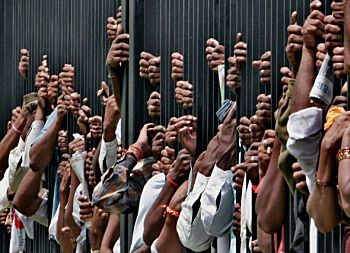
Bangalore, India
Photo: Aijaz Rahi/Associated Press
Pictures of the Day, May 30
nyt
.....................................................
of Steel and Bone
Bryan Finoki
Subtopia
I find something subtly revolutionary in this photo – a suggestion that fences alone wont stop the power of unwanteds or completely shun them out from finding their spaces in or through the gaps. There is a solidarity in these arms lurking below the depiction of the fence as being able to hold back a mob, that symbolizes how – not only is the border fence itself forged equally of bone and steel – but the human connections interwoven in the border are far more powerful than any bolted or welded barricade. To not see this human side is to accept then that the humanity in this photo is simply just another piece of the fence itself, as if body parts are an acceptable supplemental materiality in the composition of the barrier....(more)
_______________________
The Last Picture Show
Is the way photographs are collected and stored changing forever as the digital age takes an ever-firmer grip on traditional 'snap-shot' photography? The magic of discovering a box full of dusty, faded old photographs under a deceased relatives bed has a magic and poignancy to it that has changed little with the passage of time. But how will we examine a legacy left on-line, a personal collection out there in the ether? Squabbles over who gets to keep the pictures could be a thing of the past, however the tangible objects we so love to hold may soon disappear altogether. Is the family gathered around the slide projector in order to view an obsessive grandfather's travels through China a thing of the past? Is this indeed the last picture show?
_______________________
We Can't Paint Blog
A web log about photography
_______________________
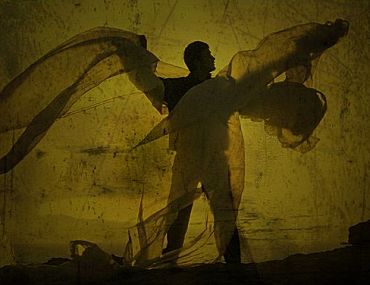
icarus redux
Susan Bein Night Park
photography and text by Susan Bein
lens culture
_______________________
Beaches and graveyards
Europe's haunted borders
Les Back
eurozine
"It is more arduous to honour the memory of the nameless than the renowned." The epigram on Walter Benjamin's memorial in Portbou, Catalonia, leads Les Back to reflect on the fate of the African migrants found dead on the coasts of Spain today.
_______________________
Sleeping Soundly in Daytime
Gu Cheng
translation from the Chinese by Aaron Crippen
people sleep lightly in the dark of night
and sleep soundly in daytime(....)
and the night hasn’t moved
in the photo studio
a wind coolly blows
behind smiles of every dimension
a wind coolly blows
the dust is getting sleepy
the camera's empty magazine is empty
...(more)
Gu Cheng, Four Poems in paralell translation from the Chinese by Aaron Crippen
Archipelago
_______________________
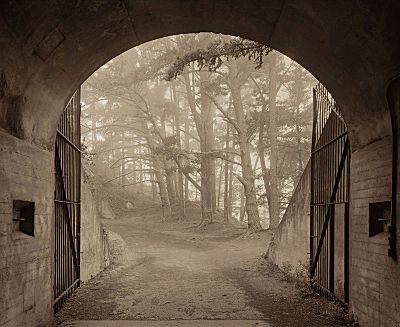
Tunnel and Gates
Kerik Kouklis
Photographers' Gallery
|



 Atlantic Wall
Atlantic Wall 












































